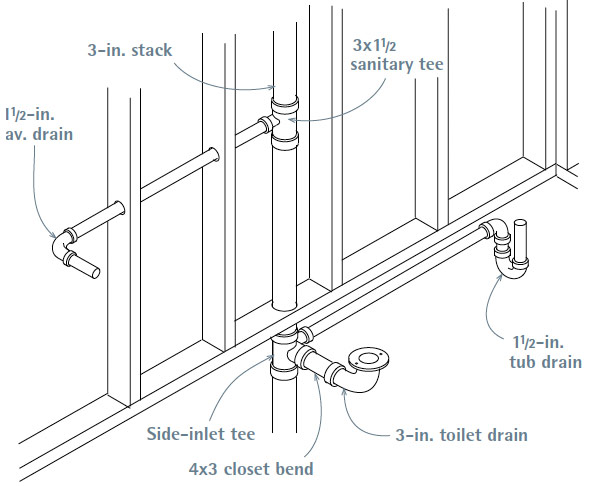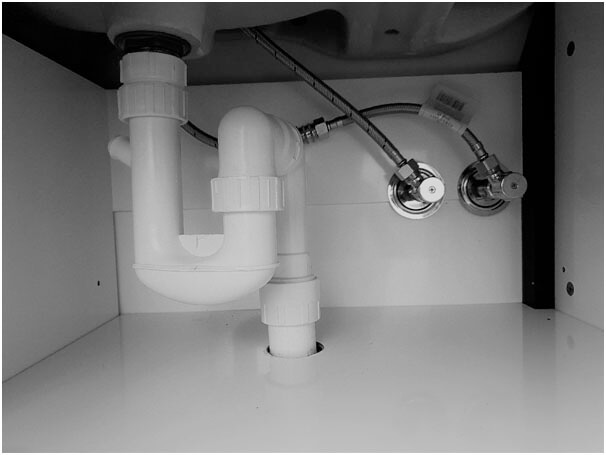Any individual will have their unique idea in relation to What Is A Plumbing Vent & How Do They Work?.

Appropriate ventilation in plumbing systems is usually forgotten, yet it is crucial for maintaining the functionality and safety and security of your home's pipes. Air flow helps regulate atmospheric pressure, protect against the build-up of dangerous gases, and make sure the reliable elimination of waste. In this guide, we will discover the value of correct pipes ventilation, exactly how it works, and the advantages it brings to your pipes system.
Exactly How Ventilation Functions in Plumbing Systems
Atmospheric Pressure Guideline
Proper air flow preserves well balanced air pressure within the pipes system. When water flows with pipelines, it displaces air. Without adequate air flow, this variation can create unfavorable stress, causing reduce drains or siphoning of water from traps, which can trigger undesirable smells to seep into the home.
Stopping Sewage System Gas Build-up
Among one of the most crucial features of pipes vents is to stop sewage system gases, such as methane and hydrogen sulfide, from accumulating within the home. These gases can pose serious health and wellness threats and are highly flammable. Vent pipelines permit these gases to leave securely outdoors.
Assisting in Waste Removal
Air flow helps in the effective removal of wastewater by stopping airlocks in the drain system. When air can move openly with the vents, it allows water and waste to stream smoothly via the pipes, reducing the threat of blockages and back-ups.
Advantages of Appropriate Air Flow
Improved System Performance
Appropriately ventilated pipes systems operate a lot more efficiently, with fewer obstructions, faster draining, and much less strain on the pipes. This effectiveness expands the lifespan of the plumbing system.
Improved Air High Quality
By avoiding drain gases from entering your home, correct air flow adds to better indoor air quality, making your living setting healthier and extra comfy.
Stopping Water Damage
Adequate ventilation helps protect against water from being siphoned out of traps, which can cause drain gases getting in the home and triggering water damages over time.
Actions to Ensure Correct Ventilation
Consulting Pipes Codes
Constantly seek advice from neighborhood plumbing codes when creating or changing your pipes system. These codes offer the needed guidelines for appropriate venting and guarantee your system fulfills safety and security standards.
Regular Assessment and Maintenance
Regular assessments can aid recognize possible ventilation issues prior to they come to be significant troubles. Upkeep jobs, such as cleansing vent pipelines and checking for blockages, are vital for maintaining the system in good working order.
Specialist Setup
For brand-new installations or major modifications, it's a good idea to hire a specialist plumbing technician. They have the knowledge to guarantee the ventilation system is correctly made and set up according to code.
Understanding Ventilation in Plumbing
Air flow in pipes refers to the network of pipelines that allow air to stream via the drain system. These vents offer multiple functions, consisting of regulating air pressure within the pipelines, avoiding drain gases from getting in the home, and aiding in the smooth flow of wastewater.
Kinds Of Plumbing Vents
Key Heap Vent
The major stack vent, also known as the vent stack, is the main air vent in a pipes system. It prolongs from the main drain line up via the roof, enabling gases to escape and fresh air to get in the system.
Branch Vent
Branch vents link to the primary pile vent and offer individual fixtures, such as sinks, bathrooms, and showers. These vents ensure that each fixture has sufficient air flow to work effectively.
Air Admission Valve (AAV).
An Air Admittance Shutoff (AAV) is a one-way shutoff that permits air to get in the pipes system without the requirement for a conventional vent pipeline expanding with the roof. AAVs are commonly made use of in improvements or locations where installing a basic air vent is unwise.
Signs of Poor Air Flow in Pipes.
Slow Draining Fixtures.
If your sinks, tubs, or commodes are draining gradually, it could be an indicator of poor air flow. Insufficient air circulation can produce a vacuum result, making it tough for water to drain correctly.
Gurgling Seems.
Gurgling audios originating from drains are often an outcome of air being sucked through water traps due to unfavorable stress in the pipelines. This is a clear indicator of inadequate air flow.
Unpleasant Odors.
Sewer odors inside your home are a red flag that your plumbing system is not appropriately aerated. This can suggest that sewage system gases are not being properly vented outside, resulting in possibly harmful problems.
Typical Ventilation Mistakes.
Poor Vent Sizing.
Making use of undersized air vent pipes can bring about inadequate air circulation and pressure discrepancies in the system. It's important to utilize vents that satisfy the specific requirements of your pipes system.
Improper Vent Placement.
Placing vents also much from the fixtures they serve can decrease their performance. Correct positioning guarantees that air can flow openly and efficiently with the system.
Disregarding Code Demands.
Building regulations provide details standards for plumbing ventilation. Neglecting these codes can result in a system that stops working to function appropriately and may result in costly repair services or carcinogen.
Conclusion.
Correct ventilation is a crucial element of any type of plumbing system, making sure that it functions effectively and safely. By understanding the importance of ventilation, recognizing the indicators of inadequate air flow, and taking steps to maintain your system, you can stop expensive issues and shield your home's air top quality.
Why Proper Ventilation Is Important In Buildings
According to ASHRAE (American Society of Heating, Refrigerating and Air-Conditioning Engineers), ventilation is defined as the process of supplying outdoor air to or removing indoor air from a dwelling by natural or mechanical means. Such air may or may not have been conditioned.
It’s notable that, in addition to its meaning in the field of engineering, the term is also used in biology. Merriam-Webster defines ventilation as: the circulation and exchange of gases in the lungs or gills that is basic to respiration.
service technichian checking ventilation
At a high level, the combination of these two definitions explains why it’s so important for buildings to have proper ventilation—the health and comfort of the occupants and visitors who rely on a building’s HVAC system to make clean, conditioned air available for people to breathe. And, when a building has proper ventilation, there are many specific benefits that building occupants enjoy.
Below we explain the downside of inadequate air movement and the upside of a well-designed, optimally functioning HVAC system.
How Poor Ventilation Can Hurt Your Business
Low air quality does more than simply make a space less comfortable for occupants. It can impact a business in a variety of ways. For example, there are health risks for employees from breathing “bad” air throughout their day.
According to the Environmental Protection Agency (EPA): A number of well-identified illnesses, such as asthma, hypersensitivity pneumonitis and humidifier fever, have been directly traced to specific building problems. These are called building-related illnesses. Most of these diseases can be treated; nevertheless, some pose serious health risks and may require prolonged recovery times after leaving the building.
Even if occupants don’t become ill due to poor building ventilation, there can be other consequences. Working in a space that is too warm and humid can make people less productive, for example. And, if the conditions in a building are continually uncomfortable, it can make it harder to hire and retain employees. Plus, customers and clients prefer not to spend time in spaces that have stagnant air, which can hurt a business.
Benefits of the Right HVAC System
Improved temperature control. In order for an HVAC system to heat or cool the air in a space appropriately, that air must flow through the heating or air conditioning system. When that movement takes place, the temperature in rooms throughout a building can be highly controlled to ensure that they don’t get too warm or too cold. Improved humidity control. The amount of moisture in the air plays a major role in how comfortable indoor air is. Too much, and everything from a person’s skin to work surfaces feel damp and clammy. Too little, and dry, itchy skin and excessive static electricity can be the result. Adequate ventilation enables HVAC systems to manage humidity levels more effectively. Increased productivity. Employees who don’t feel drowsy because of a lack of ventilation air are able to stay focused on their work, and that benefits your customers and your business. Reduced sick time. When employees are ill, they suffer and the company suffers. Continually requiring people to “pitch in” and cover for a sick coworker is stressful for them. It can also be frustrating for customers to have the person they typically work with unavailable. Good indoor air quality supports better health, which means your company can be operating at full capacity more of the time. Happier customers and other visitors. People don’t want to spend time in a building that is uncomfortable. And, unfortunately, they typically won’t tell you why they’re reluctant to visit. On the flip side, when meeting rooms and other spaces are always at the right temperature and humidity, with good air flow, customers and other visitors find it much more enjoyable to spend time at your location. More desirable space for potential renters. For building owners, well-ventilated space is much easier to rent than a building with stale, damp, or smelly air. All other factors being equal, renters are more likely to sign a contract for the more comfortable of two spaces. Better Building Ventilation: Getting Started Is Easy
Especially when a building has multiple air quality problems—temperature control, humidity, odors, etc.—it can feel like resolving them is an insurmountable task or that “there’s no way to know” what’s causing all the issues. However, the truth is that there is a science to improving indoor air quality.
Our HVAC experts can take the mystery out of an air quality problem, quickly pinpointing the cause or causes and recommending a solution for resolving them. In many cases, minor repairs or enhancements to existing equipment are all that is required. And, even if the installation of new or better equipment is necessary, we can handle that efficiently and cost-effectively, as well.
In any event, the first step is contacting Timberline Mechanical to explain the “symptoms” of poor ventilation that occupants are reporting. We can then talk with you about possible causes and how we can address them. Whether you choose to schedule a project at that point or not, having some insight on the challenges you’re facing can be very helpful.
We can also discuss system maintenance best practices. Often, air quality problems can be prevented with regular service and preventive maintenance. Building owners and property managers find that the small expense of keeping their HVAC systems functioning optimally pays off in preventing costly system repairs or equipment replacement down the road.
And, of course, implementing an effective, intelligent HVAC solution in the first place is the best way to prevent problems. That’s why owners and general contractors come to us early in the building process. We collaborate with them to develop a solution that will ensure proper ventilation and excellent indoor air quality that delivers tremendous benefits for occupants and visitors.
https://www.timberlinemechanical.com/why-proper-ventilation-is-important-in-buildings/

Do you really like reading up on Why Plumbing Air Vents Are Important? Make a remark below. We'd be pleased to hear your opinions about this piece. We hope that you come back again soon. Loved our piece of writing? Please quickly share it. Let somebody else discover it. Thanks a lot for your time. Come back soon.
Visit